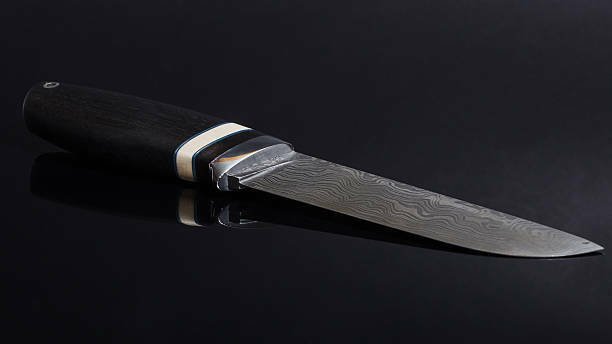hunting knives cut game, fish, and everything else 2-3 times better than knives made from any other steel. But this grade of steel is quickly covered with rust: such a knife will not “forgive” if the owner leaves it dirty for a couple of weeks or months. In the article, we will tell you how to protect a good Damascus steel knife from corrosion and explain how to get rid of it if brown spots still appear on the blade.
Why does Damascus steel rust?
Damascus is a forged set of carbon steel plates with a hardness of 61-64 HRC. Forged plates flatten and become extremely thin. Such a metal perfectly withstands sharpening, therefore it is widely used in the manufacture of knives, but does not contain alloying elements that are resistant to corrosion.
It is possible to create stainless Damascus steel, but its manufacturing technology is too complicated and rarely used in practice. Therefore, the owners of Damascus knives are constantly faced with the task of protecting the blade from corrosion.
Is a rusty knife dangerous?
If a hunting knife is covered with corrosion, you can use it. But due to contact with oxidized steel, the products will change their taste, and few people will like the result.
If a Damascus steel knife rusts for a long time, and the owner does not pay attention to it, corrosion will make the blade brittle. Because of this, the knife can break, for example, when hunting, fishing or traveling. To prevent this, it is worth mastering the care of the knife. It’s simple.
How to protect a Damascus steel knife from corrosion
The tendency to corrosion is the main disadvantage of Damascus steel. True, it rusts if the owner is too lazy to take care of the knife, for example, pushes it into the scabbard dirty. Or he doesn’t know how to properly care for him. But if the owner is careful and follows the rules, his Damascus steel hunting knife will go to his grandchildren without a hint of corrosion.
Wipe the blade only with a rag. Thoroughly clean the dirt from the blade after work. Wash your knife in cold water. Do not use hard sponges and powders – only liquid dishwashing detergent. Rinse the gel from the blade immediately: chemicals can react with the metal, causing cavities to form in it and begin to rust.
Brush the blade with olive oil if you don’t plan to use the knife for several months. Synthetic WD-40 lubricant or wax-based polish will also work, but Vaseline will not work, as it causes corrosion.
Store your knife without a leather sheath. Insert it into the sheath when you go somewhere or drive. If he lies idle at home, let him lie without a scabbard. When leather is tanned, it is impregnated with chemicals that cause steel to rust, so you should not keep metal and leather together for a long time.
Examine the cutting edge after you have worked. If you find jams, sharpen on a stone with the appropriate grit. A knife with a sharp, even edge is better protected from corrosion than a knife with a kink.
What to do if the knife is rusty: 4 ways to clean
it If the blade is covered with rust, you can save it and use the knife further. We suggest doing this:
Clean the blade with soda. You will need soda, a napkin, and rags. Wet the blade, sprinkle it with soda so that it sticks to the metal. Gently tap with a knife to loosen excess powder. Rub the desired area with a napkin until you get rid of rust. Rinse the knife, wipe dry with a rag.
Sanding. The method works if a small area is rusted. Stock up on a thin “skin” – for example, with a grit of 3,000. Rub the stain with it until you remove the rust. Rinse the knife with cold water, wipe dry with a rag. Do not use a large “skin” so as not to scratch or dull the blade.
Grate with potatoes or onions. Potatoes contain oxalic acid, while onions contain sulfonic acid. Corrosion is afraid of both. Cut a potato or onion in half, put the blade between the halves. Leave for 5-6 hours. Remove rust with a rag, rinse the knife.
Dissolve rust with vinegar. You will need a large container. Fill it with table vinegar with a concentration of 6-9% and put the knife in for 5 minutes. Remember to take it out after 5 minutes so that the vinegar does not have time to corrode the metal. Wipe the blade with a rag, rinse under cold water and wipe dry.
How to make hunting knives last a lifetime
Damascus steel will remain strong if you follow our advice.
Cut soft with a knife. If on the way the blade met a hard bone of an animal, it must be cut with an ax.
- Do not cut or chip metal. Damascus steel does not like this attitude and is not designed for rough work.
- Open cans with a can opener. And leave the Damascus steel knife for other purposes.
- Do not throw a hunting knife. Other types of knives are intended for games.
- Do not bend the blade at a large angle. Damascus steel is relatively brittle. She “doesn’t like” the barbaric treatment: the metal will crack or break. If you need to cut a particularly hard object, you should use a hacksaw or hatchet.
- Do not use a hunting knife as an assembly tool. For this, inexpensive multitools or special tools for installation work are suitable.
- Hunting knives made of Damascus steel are a necessary and beautiful item in the collection of a hunter, fisherman, and tourist. With careful attitude and proper care, it is easy to keep it sharp and durable for several decades.
read more: How To Gain Drainage
